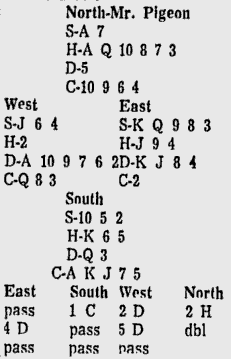By ROBERT G. POWELL Of Mr. Pigeon, a disgruntled partner once said, «That gentleman indubitably is the secret weapon of the tranquilizer industry.» This gross exaggeration of Mr. Pigeon’s character was caused by an incident on board 10 at a local duplicate game when Mr. Pigeon «got an idea» on the proper way to play his hand to defeat the opponents in a doubled contract. But the point Mr. Pigeon overkinked with his idea is that Mr. Syker, sitting West, also is known to have quite a few ideas on his own and that some of them run contrary to Mr. Pigeon’s.
Both sides vulnerable East dealer

Opening lead: Spade ace
When East quite properly passed, South opened the bidding with one club. As he and his partner were playing the weak preemptive overcall, Mr. Syker’s bid of two diamonds showed at least a six card suit, weak defensively and with nine points or less. Mr. Pigeon showed his heart suit by bidding two hearts and East guided by Mr Syker’s highly informative bid, decided to jam the bidding by catapulting to four diamonds.
South, not certain of the strength of Mr. Pigeon’s hearts, elected to pass and leave the decision of what to do up to his partner. Mr. Syker in an effort to shut nut Mr. Pigeon from the bidding, poured on more pressure by going to five diamonds. Mr. Pigeon, recognizing the gambit and not certain of making five hearts, promptly doubled for penalties and the «sure» plus score.
On lead. Mr. Pigeon took time out to review the bidding. As he and his partner, not opening four card majors in any position, were playing the one-club-forcing- for – one- round convention, South’s bid didn’t guarantee any honor strength in clubs. South, Mr. Pigeon cogitated, could have as little as x x x in clubs with, as he had failed to support hearts, the majority of his point court in a four card spade suit. If so, the lead the of the spade ace, followed by the spade seven taken by South, followed by a spade return to be ruffed by his singleton trump, Mr. Pigeon figured, would set the contract immediately and his heart ace could be taken at leisure for further penalties. With this idea firmly fixed in his mind, he laid down the spade ace, but when he saw the dummy he knew he’d made a mistake — a mistake which he quickly tried to rectify by switching to the club six in response to his partner’s spade deuce.
South took with his king and tranced. As he belonged to that school of players to whom the lead of an ace immediately followed by the shift to another suit signifies a singleton, he decided Mr. Pigeon was asking for a fast spade ruff to defeat the contract and so he returned the spade five—whereupon the roof fell in on him. Mr. Syker quickly pounced on this trick with the spade jack in his hand and drew a deep sigh of relief when Mr. Pigeon helplessly followed with the spade seven.
Mr. Syker then drew trump in two quick rounds, cashed his good K-Q-9 of spades in dummy, pitching on these the losing heart deuce and club eight. He next called the heart four from dummy and ruffed in his hand with the diamond six. Then he led the club queen, ruffed in dummy with the diamond eight and claimed the balance of the tricks with his remaining good trump. Five diamonds vulnerable bid, doubled and made for plus 750 and a very frigid bottom on the board for Mr. Pigeon and his partner.
At other tables, where the North-South players weren’t playing one-club-forcing, the North player believed his partner’s opening bid and made the opening lead of the club six. South took in his hand with the king and returned the six of hearts, his partner’s bid suit. North took in his hand with the queen and returned the ace which West ruffed. Later on, North was able to cash his ace of spades to set the contract one trick doubled — plus 200 for North-South and an average board.
But, as you are well aware, this is not what happened at Mr. Pigeon’s table.
